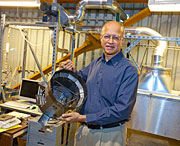- Number 355 |
- January 30, 2012
Ashok Gadgil’s Physics in Service to the World

Ashok Gadgil.
Ashok Gadgil, Director of the Environmental Energy Technologies Division at DOE’s Lawrence Berkeley National Laboratory, already knew he wanted to be a scientist when he was nine years old. But when he was growing up in Bombay (Mumbai), India, medicine and engineering were more respectable pursuits than pure science, and at first he was largely self-educated. He read voraciously in his father's home library, which included issues of Scientific American, and concocted chemistry experiments that stunk up the house. Before he was out of the sixth grade he’d mastered all his future high school textbooks.
Gadgil went on to earn physics degrees from the University of Bombay, the Indian Institute of Technology at Kanpur, and, in 1979, his Ph.D. from UC Berkeley. It was only shortly after his arrival in the US that the mid-1970s energy crisis had struck. He realized that "if the United States – where five percent of the world's population consumed almost 40 percent of the energy – was in trouble, India would be flattened," and from then on he concentrated on environmental physics, with a special penchant for projects in the less privileged parts of the world.
He joined Berkeley Lab in 1980, where much of his research has been with large-scale programs in solar energy, biodiversity, conservation, and the modeling of indoor airflow and pollutant transports in the interests of cleaner air.
Meanwhile, his extraordinary yet simple inventions have focused explicitly on human distress, addressing energy efficiency and water purification. First came “UV Waterworks” – an effective and inexpensive technology to disinfect drinking water and reduce life-threatening diseases in developing countries, and for disaster relief where flooding or other emergency conditions pose threats to clean water. He invented tea-bag-sized water filters filled with treated coal ash to leach deadly arsenic from well water in Bangladesh. He is perhaps best known, however, for cheap and efficient wood-burning cooking stoves, first developed for fuel-poor refugee camps in Darfur. More recently, similar stoves have been tailored to conditions in Ethiopia, Mongolia, and Haiti.
Gadgil’s inventions have garnered over two dozen national and international awards, most recently Abu Dhabi’s Zayed Future Energy Prize. The recognition underscores his continued focus on technical, economic, and policy research to encourage energy efficiency and its implementation in developing countries.
Says Gadgil, “Vigorous efforts and political leadership are needed to make the concept of sustainability an integral part of policy decisions.” He adds, "The nice thing about being at Berkeley Lab is that even when conventional wisdom says it can't be done, the tradition is to go out and do it anyway."Submitted by DOE's Lawrence Berkeley National Laboratory
